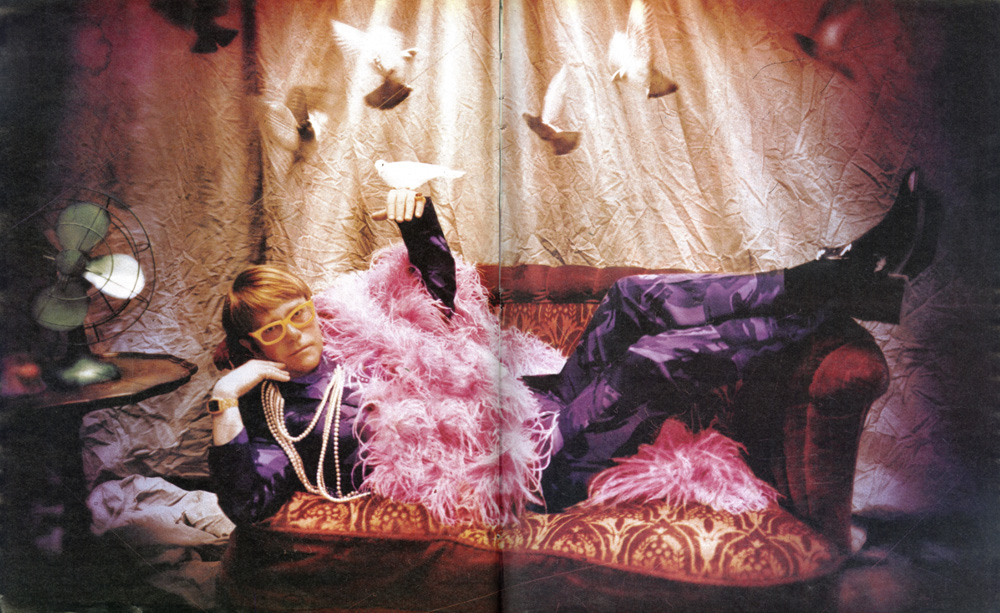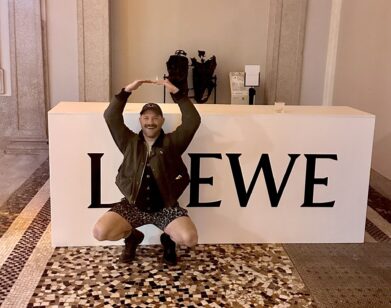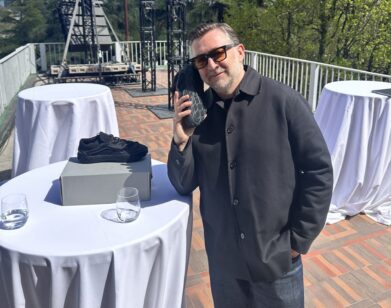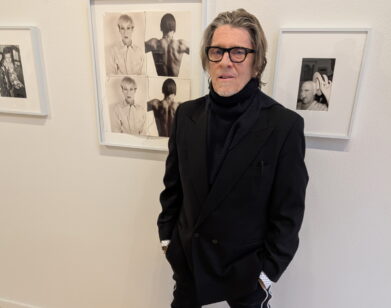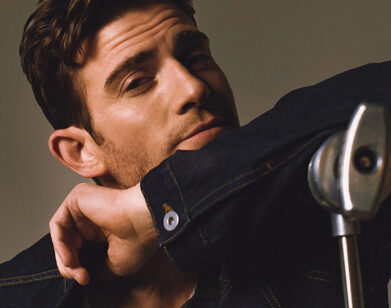New Again: Elton John
According to The New York Times, Elton John recently inked a deal with Henry Holt & Company to publish his autobiography in 2019. Famously forward-thinking, John admitted in a statement that he’s “not prone to being a nostalgic person. … As I look back, I realize what a crazy life I have had the extreme privilege of living.” We could have told him that much, but we’re glad that the “Tiny Dancer” singer is finally willing to recount his legendary life and career on his own terms.
In light of John’s upcoming memoir, we’re reprinting the rock icon’s January 1998 Interview cover story below. If it’s any indication, the book looks to be about as candid as celebrity memoirs come; John is anything but shy as discusses his history of substance abuse and lively sex life throughout the ’70s and ’80s. The interview also finds the refreshingly introspective Mr. John touching upon his famed art collecting activities, newfound tranquility with now-husband David Furnish, and the murder of his dear friend Gianni Versace in the previous year. —Frank Chlumsky
It’s Him!!
Interview by Neil Tennant
He may have just scored the biggest-selling single of all time and a hit musical on Broadway, but Elton John is so bursting with new projects that even his mum can hardly keep up with them. For her—and for you, too—Elton John shares the latest with Neil Tennant of the Pet Shop Boys.
NEIL TENNANT: Here we are in your new house in the south of France.
ELTON JOHN: I’m addicted to buying a piece of property, doing it up, and then buying another piece. My mum always wanted me to put my money in bricks and mortar instead of up my nose. But I think we’ve got enough houses now and I’m going to stop for a bit. I’ve always liked it down here, even though in Tantrums and Tiaras I said I’d never come back.
TENNANT: Each of your houses has a different style and a different approach. Do you get the most out of them when they’re in process, or when they’re finished?
JOHN: I never go and see them as they’re being done.
TENNANT: How do you think your taste as a collector has developed over the years?
JOHN: I’ve always been an accumulator, but I haven’t always been a collector in the fullest sense. Before I redid the house in Windsor [England] in 1990, it was a whole mishmash of things I bought from all over the world, a bit like a high-class junk store. When I got sober, my taste completely changed. I either like things really traditional or really modern, and I don’t really like things in between that much.
TENNANT: When did you start getting interested in modern art?
JOHN: I knew nothing about art, actually, until I started collecting it. I began with art nouveau in the early ’70s, and when I bought the place in Atlanta about six years ago, I started to buy really contemporary art—I have big high ceilings there, so I was able to get bigger canvases. In Atlanta I started collecting photography in a big way, too. That’s when I really started collecting.
TENNANT: How and what kind of photos do you collect?
JOHN: I collect all sorts of photographs.
TENNANT: What will happen to the collection?
JOHN: Well, England hasn’t got a major photography museum.
TENNANT: It’s an amazing opportunity to have the money to be able to educate yourself about art.
JOHN: Absolutely. The way I’ve learned about art is by buying it. And reading about it. And looking at it. One of the great things about my friendship with Gianni [Versace] was that wherever we were, he would drag me to museums, to antique shops, he would drag me to churches and historical buildings and houses with great private collections.
TENNANT: Were you here in France when you heard that Gianni had been murdered?
JOHN: Yeah. I got a phone call from John Reid, my manager, who also told me about John Lennon’s death. And as with Lennon, I just didn’t believe it. I could not believe it. Gianni was such a huge part of my life. Two of my best creative friends have been murdered outside their fuckin’ houses in America—Gianni and John. Gianni was supposed to be here now—he was supposed to be here at the same time as you guys—and you would not have gotten up from the table without having had a stimulating conversation. I loved that about him so much. It’s very important for artists to do that. Artists don’t really do that together very much, do they? They keep themselves to themselves. But I’ve reached the stage of my life where learning is so important to me. I go through the past enough when I play my old songs on stage. And I don’t mind doing that. But I want to think about the future.
TENNANT: I’ve always been intrigued by your neighbors at Windsor: the royal family. How did your acquaintance with them come about? [Editor’s note: This interview was conducted prior to the death of Diana, Princess of Wales.]
JOHN: My first royal meeting was a dinner with Princess Margaret at a restaurant. A friend of mine, Brian Forbes, took us to dinner with her. It was in Hampstead, and I felt like I didn’t know which fork went with what knife, and I was terrified. John Reid and I both went. And then I got invited to dinner at Royal Lodge, Windsor, which is just across the road from my house. I played the piano and did the Highland fling with the Queen Mother, and had a brilliant time. [laughs] I’ve had a few occasions in my life when I’ve thought, God, I was born on the cow sloughs in Pinner, and here I am in these surroundings.
TENNANT: Didn’t you and the queen dance to “Rock Around the Clock”?
JOHN: At Prince Andrew’s twenty-first birthday party, the music segued from “Hound Dog” to “Rock Around the Clock,” and Her Majesty asked us if she could join us, which I thought was amazing. I said, “Of course you can, you’re the queen.”
TENNANT: How do you feel about growing older in the music business?
JOHN: I’m still as fascinated with the music business as ever. I’d love to do an electronic album like Prodigy or Underworld. I really like that sort of music. I love what you do, too, but I don’t really understand it very much, and I just think it’s dangerous to jump on a bandwagon if you haven’t got someone who knows what they’re doing. I once did an album of disco songs called Victim of Love, which was leaping on a bandwagon that was already dying. After that I thought, I’m just gonna stick to what I do best.
TENNANT: Have you ever tried playing around with new technology?
JOHN: No. I’m so untechnical. My latest album, The Big Picture, is mostly ballads. I’m really a ballad writer.
TENNANT: Yet you’ve written much of the music for two stage musicals, Aida and The Lion King, the latter of which started life as a very technical animated film from Disney.
JOHN: True. And I’ve also written the music for an animated movie for DreamWorks. Doing other things gives me other strings to my bow. I don’t want to do the same thing all my life—that would be much too boring. You do other things as well. You’re composing for musical theater.
TENNANT: We’re writing a piece for theater as well, with [playwright] Johnathan Harvey. I think musical theater is wide open at the moment because the music in musicals isn’t contemporary. Maybe there’s a reason for that. Maybe it doesn’t work.
JOHN: We tried to write really contemporary songs, or modern-type songs, for The Lion King, and it worked really well.
TENNANT: Your longtime songwriting partner, Bernie Taupin, hasn’t been involved in those kinds of projects.
JOHN: Bernie’s not really interested in writing lyrics for animation movies because it can be a chore. You may have to do fifty rewrites to each song because the story can really change. But we would love to write a musical for the screen and start from scratch, not just take something that’s been on the stage and adapt it.
TENNANT: How did your relationship with Bernie begin? Were you ever in love with him?
JOHN: Early on in our working relationship, I had a crush on him. I don’t think it was a sexual crush so much as the fact that he was like a brother and I’d never had a brother, or a best friend.
TENNANT: What’s your relationship like now?
JOHN: It’s good. It’s very easy. We’re very different. Bernie is the brown-dirt cowboy: He has this ranch with his horses, and he loves that life. We are chalk and cheese, basically. I suppose that’s why we’ve always gotten on—because there’s always a different point of view.
TENNANT: When did you first think you were gay?
JOHN: [sighs] At school I used to have crushes on people, but not really any sex at all, male or female, until about twenty-three. And then it was like a volcano. Out it came, it was such a relief. I never had any sex education when I was at school. Sex was never discussed.
TENNANT: We had a book at home, a Catholic sex manual. I read it, and it said there was this terrible thing called masturbation, and I’d never masturbated—I was twelve.
JOHN: The first time I masturbated I was in pain. I was so horrified.
TENNANT: So was I.
JOHN: And my parents found out because I’d used all my pajamas. And then I got completely and utterly ripped apart for doing it. Sex was completely frightening. At school everyone boasted about sex. Meanwhile I was dying to be molested by someone. When I went to therapy, my therapist said, “I have to ask you if you were molested.” And I said, “No, actually.” But I was dying to be molested by someone—just to teach me, just to find out, you know?
TENNANT: Did your drug use go hand in hand with all the sex in the early ’70s?
JOHN: No. The first five years were caught up with productivity. We put out thirteen albums in five years, and various different singles. I think it all caught up with me by 1976, and that’s really when I started getting more heavily into drugs. The first five years, I didn’t touch anything.
TENNANT: Really?
JOHN: No, I was a good boy.
TENNANT: Some artists think that drugs have done things for their creativity. You could argue that it did something for the Beatles. And for David Bowie.
JOHN: Or Jimi Hendrix. Well, it worked for them, but it didn’t work for me. I thought that instead of writing ten songs a day, I could write twenty. But I was wrong.
TENNANT: You always seem to have that urge to work.
JOHN: Yeah, I love to work. It fascinates me. And I love seeing who’s coming up, who’s got the charisma to last, who’s got the intelligence to move on to other things. I’m so glad now that I’m stuck behind the piano, because when you’re fifty it’s very hard to waddle around the stage.
TENNANT: You and David Bowie seem to be among the few artists of your peer group who listen to new records.
JOHN: Well, it’s just more interesting. What do you think the next thing will be?
TENNANT: I don’t know. I’m waiting for a new piece of technology to come along and make us all do everything differently. What do you think of sampling?
JOHN: I like sampling; it doesn’t bother me whatsoever. Some artists get really upset about it. I just think it’s fun. No one’s ever sampled one of my records. I’m really pissed off! No one molested me, no one sampled me.
TENNANT: The two are related.
JOHN: I want to be sampled, puh-leeze. [both laugh]
TENNANT: To go back to your early heyday for a minute, there must have been great parties in the ’70s.
JOHN: Well, it was Studio 54. You can’t get much more party than that. But they were fun parties, like dancing, not just staying in the back room doing coke. It was out there on the dance floor.
TENNANT: So who’d be on the dance floor?
JOHN: Diana Ross, Rod Stewart—I don’t know if I ever went to Studio 54 with Lennon. I don’t think I did; we used to hang around in our hotel suites. And who else was at Studio 54? Oh, beautiful boys, beautiful girls. Rollerena, all those people. It wasn’t a bitchy scene.
TENNANT: So you had a strong friendship with John Lennon in the ’70s?
JOHN: Yeah. I met him through a friend of mine, Tony King, who was working for Apple Records.
TENNAT: Oh, I know Tony King.
JOHN: Tony and I had been friends for years. Tony worked for us, and then worked for Lennon, and now he’s working for the Rolling Stones. John was making a video in Los Angeles, and Tony was dressed up as the queen. I met John under those circumstances. He would come to my shows and we’d have dinner and hang out and laugh. And my parents would come over to New York and we’d have dinner with them.
TENNANT: Your parents with John Lennon? Wow!
JOHN: Yeah. My dad took his teeth out and put them in a glass of water when he went to the loo. Very nice. But we had so many laughs together. He was so funny, John. There was a crazy element to him as well, but there’s a crazy element to most artists. I just adored spending time with him.
TENNANT: When you were holed up in the hotel suite with John, what would be going on?
JOHN: We’d do drugs and we’d play games and we’d just have a basic laugh. It was a fun time, not an intense, druggy evening. It was all about laughing helplessly.
TENNANT: Were you part of the glam-rock scene in Britain in the early ’70s?
JOHN: Not really. Although I used to be very friendly with Marc Bolan [vocalist and guitarist with the band T. Rex, he died in 1977]. With Marc, as with Lennon, we were always talking about what we were gonna do next. I miss both of them tremendously.
TENNANT: You and I both knew a lot of people who died because of AIDS. Often there has been this long, drawn-out struggle before they died. But someone being taken out like Gianni or John is very different. It must be difficult to come to terms with.
JOHN: Yes. You get very angry, and then you get frustrated, and then you hear a piece of music, and in certain situations you cry. With Gianni, I can’t believe I won’t get that phone call saying [imitating Versace’s accent], “Come on, you bitch. You bitch, where are you? Come on, let’s go shopping, let’s go to a museum, let’s go to the Guggenheim.”
TENNANT: It’s too early to say whether Gianni’s death was the end of an era, but John Lennon’s death certainly felt like that, and maybe, symbolically, the beginning of the ’80s. How would you characterize your life in the ’80s?
JOHN: Oh God, from one relationship to another. To marriage. Not particularly happy. Lotta work. Good success with albums.
TENNANT: You went from one relationship to another?
JOHN: Yeah. I would walk into a club and see someone I hadn’t even met and I would already have them on the conveyor belt. They’d come out with a Versace shirt and a Cartier watch at the other end. But none of those relationships worked. You can’t do that much drugs and clubbing and get into sordid scenes and expect a relationship to last.
TENNANT: Is sex still as important to you as it used to be?
JOHN: My sex drive has gone down so much since I’ve stopped doing coke. I was one of the few people that, when I did coke, I had an enormous sex drive. I still have a healthy sex life today, but it’s not so important.
TENNANT: It’s not the ’70s anymore.
JOHN: No. Although I can still drive along in the car and see someone really beautiful and think, Oh God, I’d really like to see him naked. I always wanted a machine that no one else had that you could switch on to see somebody naked. People are very attractive. But I’m very happy. I would be crazy to throw my life away. I love David [Furnish] very much, and we have a great life together.
TENNANT: You’ve done a huge amount of charity work with AIDS. How does your AIDS foundation work?
JOHN: There are two separate ones: There’s one for North America and Canada, which is run out of Los Angeles; and there’s on in London, which covers London and the rest of the world. When we started five years ago, we were giving a lot of money to delivering food, to nursing, etc. That’s all changed with this new medicated.
TENNANT: That’s right.
JOHN: There’s been a radical rethinking of how to dispose of the money, and it’s now going towards more medicine, more counseling for people who thought they were gonna die and now are living; people who’d given up, sold everything, left their jobs. I want to keep the foundation small because then I can watch what goes on.
TENNANT: You’ve recorded a track for this Noel Coward record I’m doing for the Red Hot AIDS Charitable Trust, right?
JOHN: Yup. When do you think that album’s gonna come out?
TENNANT: Early this year—in Britain, anyway.
JOHN: Who’s actually doing the album?
TENNANT: Apart from yourself and the Pet Shop Boys, we’ve got Paul McCartney, Suede, Bryan Ferry, and Black Grape.
JOHN: And they’re all Noel Coward songs?
TENNANT: Yeah. I’m trying to get people who are in a strand of music that’s theatrical, and all of them play characters through their music. I think it’s going to work as an album.
JOHN: The album is part of a bigger project.
TENNANT: Yeah. There’s also a three-part documentary on Coward next Easter on the BBC. I think it’ll be on PBS in America. So in Britain we’re tying in with that, doing a little documentary [of a concert] that goes with the album.
JOHN: I’m going to sing “Twentieth-Century Blues” on the album. Recently I bought a Marianne Faithfull album where she does a version of it. I’m a big, big fan of Marianne Faithfull.
TENNANT: “Twentieth-Century Blues” is quite introspective. It seems like a good song for you—even though you’re very uncomfortable with any level of psychobabble, aren’t you?
JOHN: Me? Uncomfortable? I’ve done so much of it. I’ve been through therapy and treatment, and I went to all my AA meetings. I went to three years of them, and suddenly I found myself in a social situation only able to talk about the fact that I couldn’t drink anymore and didn’t take coke. And people were dying of boredom in front of my eyes. They would see me come into a room and throw themselves out the window. I realized that I’d gotten clean and sober in order to actually get back into life, and that I had to do that. I haven’t been to an AA meeting in four years. They were very important to me at the start, and I’m not knocking the organization at all, it does a great job. But I don’t want to spend the rest of my life talking about when I used to drink or when I used to take drugs. I’m more interested in the future.
THIS INTERVIEW ORIGINALLY RAN IN THE JANUARY 1998 ISSUE OF INTERVIEW.
New Again runs every week. For more, click here.

